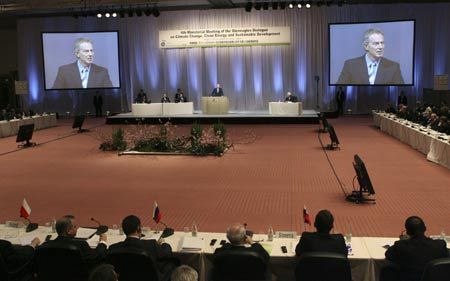The Group of 20 4th Ministerial meeting of the Gleneagles Dialogue on Climate Change, Clean Energy and Sustainable Development concluded in Chiba, Japan, on Sunday as differences between developed and developing nations on how to share greenhouse gas emissions reduction responsibilities remained unsolved.
As rich nations urged the developing world to cut carbon dioxide emissions by absolute values, the latter called on the developed countries to bear more obligations in global anti-climate change efforts.

Former British prime minister Tony Blair delivers a speech during an opening session at the G20 meeting on climate change in Chiba, near Tokyo, March 15, 2008. The three-day G20 meeting of environment and energy officials came after world nations agreed on the Indonesian island of Bali last December to launch two years of UN-led talks on a global climate pact. [Agencies]
Developed nations should compensate for their historical emissions and change their current unsustainable living styles to reduce high-level per capita emissions, a lot of representatives from developing nations said in their speeches at the meeting.
At the opening ceremony on Saturday, former British Prime Minister Tony Blair admitted that it's unfair to force developing nations to sacrifice their strong will for industrialization.
"It's commonly agreed that the earth could be saved only when all members of the international community participate in the process. However, developing countries worry about their economic growth being constrained by environmental obligations and all participants know it will not be easy to find double-win schemes" said Akira Amari, minister of the Japanese Economy, Trade and Industry, at a press conference following the two-day meeting.
As the concept of "common and differentiated responsibilities" has been accepted by all, participating nations were still far apart over what are common responsibilities and what are differentiated responsibilities, Amari said, adding that to mitigate such divergent understandings and explanations may be a time-consuming procedure.
Developing countries questioned the meeting's defining participating members as "major emitters."
"Why should India, whose per capita emission is one ton, be called as one of the top emitters as that of the United States is about 20 tons and that of Europe is about 10 tons," said Ajay Mathur, an official from India.
The meeting involved China, India, South Korea, Mexico, Australia, Indonesia, Spain, Poland, South Africa, Iran, Brazil, Nigeria and the G-8 industrialized nations.
Xie Zhenhua, vice chairman of the China National Development and Reform Commission, called on developed nations to allocate, in accordance with a U.N. treaty, some of their Official Development Assistance to set up a fund facilitating the distribution of high-end technologies, indicating that developing nations should enjoy free or low-cost access to those environment-friendly technologies.
China supports the proposal of establishing the Multilateral Technology Access Fund which could bring more technologies into the box of "public goods," Xie said in his speech.
Japan's proposal to calculate potential CO2 reductions on a sector-by-sector basis was widely questioned at the meeting, with opponents from both the developing and the developed worlds expressing concerns that such methods may derail the current UN-led negotiations to create a post-Kyoto global climate framework.
The meeting is the first in a series of ministerial meetings in the run-up to the Group of Eight summit slated for July in northern Japan's Hokkaido Prefecture.
While recognizing the meeting as a good forum to exchange ideas, Xie warned against transforming it into a new dialogue mechanism which could disturb U.N.-led negotiation process for Conventions and Protocols.
(China Daily March 17, 2008)